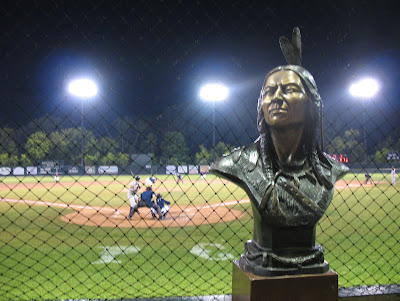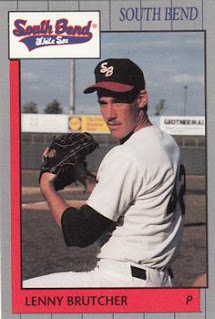Interview Part 2: Rob Leary, His Potential
 |
| Community Field in Burlington, Ia., in 2010. Rob Leary played at Community Field in 1988 with the visiting Rockford Expos. (G21D Photo) |
Part 3: Fortunate Man
Note: Special thanks to former Marlins minor league coach Randy Hennis for making this interview with 2014 Miami Marlins bench coach Rob Leary possible.
Early on in his playing career, it seemed club officials saw him as something other than a player, Rob Leary recalled recently.
Playing at single-A Rockford in 1988, it was Leary whom club brass asked to help another player transition from the infield to behind the plate, he recalled.
"So, I kind of hand an inkling that, at some point, that they would be interested in me coaching," Leary recalled.
Leary was then in his third season as a pro. He ended up getting just one more before the coaching offer came. When it came, Leary took time to think about it, and he took it.
He's been a coach in one capacity or another ever since. He continues in 2014, serving as a bench coach in the major leagues, with the Miami Marlins.
Leary spoke to The Greatest 21 Days by phone recently from San Diego, where the Marlins were taking on the Padres.
He spoke about his beginnings in the game as a youth south of San Francisco, working his way up through college and then into the pros. He also spoke of his turn to coaching, and his eventual arrival in the bigs.
 |
| Olympic Stadium in Montreal in March 2014. Rob Leary worked in the minors, hoping to play there. He later helped send other players there. (G21D Photo) |
His first stop was the rookie Gulf Coast League.
"It was certainly different," Leary said of the transition from college to the pros. "It was baseball everyday."
Leary recalled the move from aluminum bats to wood bats as a challenge. But he got to play four to five times a week, something he said was great.
He also got to see the minor leagues. In that first season, Leary got to play at three different levels. He played most of his time in the GCL, but he also got brief time at single-A West Palm Beach and AA Jacksonville.
He recalled getting to meet many future teammates and coaches with the moves, as well as just play at higher levels.
 |
| A St. Lucie Met behind the plate at the former Thomas J. White Stadium in 2011. Rob Leary played and later coached in the Florida State League. (G21D Photo) |
"That's really how the game is," Leary added. "Everything can change over night for various reasons, so many of them that aren't under your control."
Leary got some stability in 1987, playing exclusively at West Palm Beach. He moved to single-A Rockford for 1988. One of his teammates that year, the one he helped transition to catcher, was Greg Colbrunn.
For 1989, Leary moved up to AA Jacksonville. He got into 48 games there, as well as nine back at West Palm Beach. He never really hit well, at Jacksonville he hit .212. But he could catch.
Throughout those years, Leary recalled, he always thought he had a chance to be a major league player.
"I wasn't a big bonus baby, a major prospect or anything like that," Leary said. "But I always believed that I had the skills and I certainly had the will to win and to advance from one level to the next."
 |
| Burlington Bees at the dugout rail at Community Field in 2010. Rob Leary played and later managed there with visiting Rockford. (G21D Photo) |
"I truly believed that I was on my way," Leary said. "I think the biggest thing is I didn't put up and just never hit as well as I could have to be able to advance to those next levels."
Then came spring 1990. Leary knew he hadn't had the greatest year offensively in 1989, but he was hoping to continue playing.
Soon, though, the Expos' new farm director John Boles took Leary aside and laid out for him Leary's playing prospects in the organization, as well as his prospects in another capacity, coaching.
"He was very respectful and it was a great conversation," Leary said. "I had the utmost respect for Jon and the organization to come in and tell me very directly how they felt."
If Leary didn't want the position, he was told, he'd be battling for a position at the AA level. But they thought his future was in coaching. He had some leadership qualities they liked. He could become a solid coach, they told him.
 |
| A Tampa Yankee catching at West Palm Beach in 2011. Rob Leary played and later coached at West Palm Beach's old Municipal Stadium. (G21D Photo) |
With that, though, he still got to play some. Leary served as a player-coach back at Rockford. He got into 34 games there and hit .243. At the end of the season, he even got to move up to AAA. He got two at bats there, picking up a double.
With season's end, Boles returned to Leary. This time he had a full-time managing position for 1991 in the Gulf Coast League. By mid-season, Leary was managing at Rockford.
The 27-year-old was managing single-A instructing players only a few years younger than him. But Leary made it work. He had good coaches around him, he recalled. He also made it clear to his players that he would show them respect from the first day.
"With my personality and experience, I think it was actually a benefit to me," Leary said of the small age difference between him and his players. "Because being close in age, having an understanding o what these guys were going through, the ones that are succeeding and the ones that are having difficult times.
 |
| At Montreal's Olympic Stadium in March 2014. In 1990, Rob Leary turned from trying to get to Montreal to helping others get there. (G21D Photo) |
Leary said he believes players then and players today understand what kind of coach and what kind of a person he is and that works to his benefit.
"I understood at the early stages of my coaching career that it's not about me, it's all about the players and the organization," he said, "and trying to help each player that walks through the door to realize their potential and their dreams."
From those early stages as a coach, Leary went on to build a career that helped himself realize his potential - as a major league coach.
Part 1: Great Decision | Part 2: His Potential
Part 3: Fortunate Man
Go to Part 3: Rob Leary, Fortunate Man







